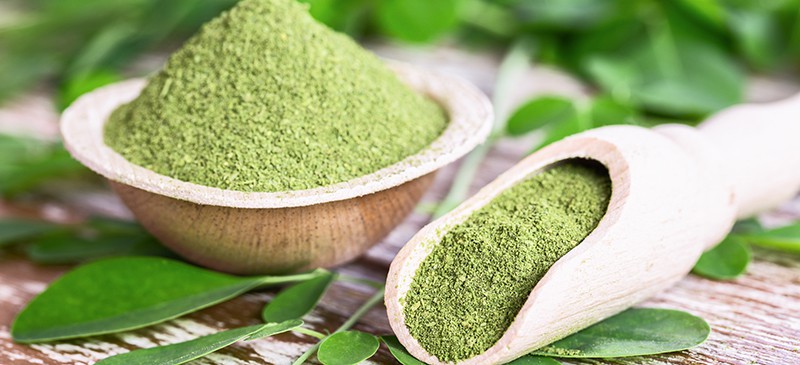I’ve recently added organic moringa leaf powder into my diet. As the powder is bitter and has the taste of raw leaves, I sprinkle about half a teaspoon of powder into my coffee every other morning to mask the taste. Moringa leaf powder does wonders in helping me ‘evacuate’ every morning.
Moringa tastes like a mix between horseradish and asparagus. It might not have the most appealing flavor, but it’s a supplement with one of the the richest supplies of vital nutrients in the world, which makes the off-putting taste worth it.
Moringa is a nutrient-dense plant that is rich in vitamins, calcium, iron and essential amino acids. It has many healthful compounds that can benefit the body in a number of ways. Widely known as “drumstick tree” in India, moringa goes by different names in different countries and regions. The tree is native to India but also grows in Asia, Africa, and South America.

Moringa has been used for centuries due to its medicinal properties and health benefits. It also has antifungal, antiviral, antidepressant, and anti-inflammatory properties.
Moringa contains many healthful compounds such as:
- vitamin A
- vitamin B1 (thiamine)
- B2 (riboflavin)
- B3 (niacin), B-6
- folate and ascorbic acid (vitamin C)
- calcium
- potassium
- iron
- magnesium
- phosphorus
- zinc
It is also extremely low in fats and contains no harmful cholesterol.

To date, over 1,300 studies, articles and reports have focused on moringa benefits and this plant’s healing abilities that are important in parts of the world that are especially susceptible to disease outbreak and nutritional deficiencies. Research shows that just about every part of the moringa plant can be utilized in some way, whether it’s to make a potent antioxidant tea or produce an oily substance that lubricates and nourishes the skin.
Throughout the world, moringa is used for treating such widespread conditions as:
- inflammation-related diseases
- cancer
- diabetes
- anemia
- arthritis and other joint pain, such as rheumatism
- allergies and asthma
- constipation, stomach pains and and diarrhea
- epilepsy
- stomach and intestinal ulcers or spasms
- chronic headaches
- heart problems, including high blood pressure
- kidney stones
- fluid retention
- thyroid disorders
- low sex drive
- bacterial, fungal, viral and parasitic infections
- protects and nourishes skin
Other impressive health benefits of moringa is its ability in balancing the hormones and slowing down the effects of aging.
A 2014 study published in the Journal of Food Science and Technology tested the effects of moringa (sometimes also called “drumstick”) along with amaranth leaves (Amaranthus tricolor) on levels of inflammation and oxidative stress in menopausal adult women. Knowing that levels of valuable antioxidant enzymes get affected during the postmenopausal period due to deficiency of “youthful” hormones, including estrogen, researchers wanted to investigate if these superfoods could help slow the effects of aging using natural herbal antioxidants that balance hormones naturally.
Ninety postmenopausal women between the ages of 45–60 years were selected and divided into three groups given various levels of the supplements. Levels of antioxidant status, including serum retinol, serum ascorbic acid, glutathione peroxidase, superoxide dismutase and malondialdehyde were analyzed before and after supplementation, along with fasting blood glucose and haemoglobin levels. Results showed that supplementing with moringa and amaranth caused significant increases in antioxidant status along with significant decreases in markers of oxidative stress.
Better fasting blood glucose control and positive increases in haemoglobin were also found, which led the researchers to conclude that these plants have therapeutic potential for helping to prevent complications due to aging and natural hormonal changes. Moringa benefits the libido as well and might work like a natural birth control compound, according to some studies.
Although it’s been used as a natural aphrodisiac to increase sex drive and performance for thousands of years, it seems to help reduce rates of conception.
How to Consume Moringa
It’s recommended that you start by taking half a teaspoon of dried moringa orally per day for three to five days, increasing your intake slowly over two weeks as you get used to its effects. Most people choose to take moringa every several days but not every single day for long duration of time, since it can can cause laxative effects and an upset stomach when overused.
Caveat
Like all supplements, the United States Food & Drug Administration (FDA) do not monitor moringa, so there might be concerns about purity or quality. It is essential to understand the validity of the claims made by the manufacturers, whether it is safe to use, and what potential side effects there may be.
There is plenty of recent research to back up the benefits as stated above, though many of the studies are still in the preliminary stages or the tests have only taken place on animals as opposed to humans, so there is plenty more to be done.
If you have a health condition, check with your doctor before you start consuming moringa.
